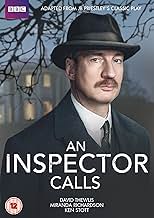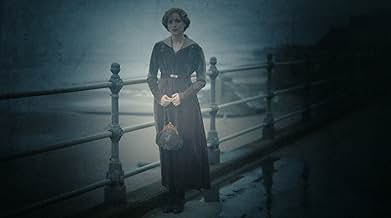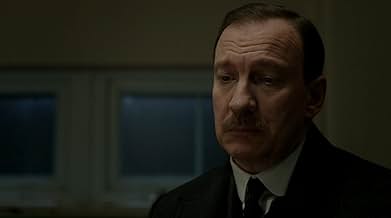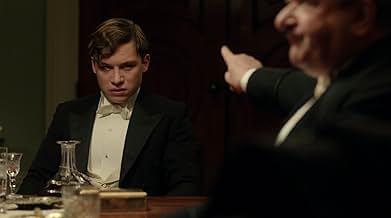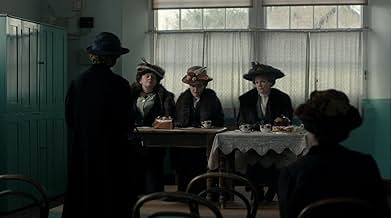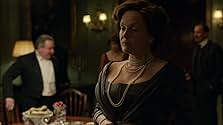Aggiungi una trama nella tua linguaA mysterious inspector investigates the wealthy Birling family and their dinner guest following the suicide of a young woman.A mysterious inspector investigates the wealthy Birling family and their dinner guest following the suicide of a young woman.A mysterious inspector investigates the wealthy Birling family and their dinner guest following the suicide of a young woman.
- Regia
- Sceneggiatura
- Star
- Premi
- 2 vittorie e 5 candidature totali
- Gate Keeper
- (non citato nei titoli originali)
- Posh Lady
- (non citato nei titoli originali)
- Millward's Shop Customer
- (non citato nei titoli originali)
- Young Eva
- (non citato nei titoli originali)
- …
- Factory Worker
- (non citato nei titoli originali)
- …
- seaside Photographer
- (non citato nei titoli originali)
- Factory Worker
- (non citato nei titoli originali)
Recensioni in evidenza
To be honest, right at the beginning when the characters were presenting themselves at the dinner table I found most of their portrayals quite bland and out of character in a sense- especially Eric and Sheila. I found them lacking that strength and uniqueness that had made me strive for them while reading the play, but then again it's true that at the beginning their personalities were much more superficial and that were mostly developed as the play progressed- something which was shown naturally in the film.
Nevertheless, as soon as the plot starting moving the skepticism faded away and I was left awestruck by the actors' outstanding performances; Mr and Mrs Birling were just how I pictured them throughout the story; Gerald was given much more emotional depth than what I had imagined and Eric even though it wasn't how I initially thought of him made me comprehend a completely different interpretation of his character. I am not quite sure of Sheila yet, but I do have to admit that Chloe Pirrie reflected her major character development, but I imagined Sheila as a more immature and naive girl in the beginning. Let's not forget about Sophie Rundell's breathtaking job as Eva: taking only brief descriptions from a dead girl and turning that into a round character with a profound, political and representative meaning behind it.
Even if the characters' portrayals is essential to the film, what really sticks to the audience are the audiovisuals, and I can assure you this film excelled in that job. The shots were beautiful and gave the story a deeper meaning for me as a viewer and indeed hinted many subtle messages that otherwise wouldn't have made much sense. Above all, what most impressed me was the score; from the beginning until the very end the score was used skilfully to match the characters' emotions in certain scenes, but the feeling of strings and a piano matched the main themes of the play, and probably may be the main reason for my passionate liking of this film.
Eva Smith does not appear in the Priestley text; in this version she is transformed into a hard-working girl who is not backward about coming forward. Hence she becomes an object of affection for factory-owner Arthur Birling (Ken Stott), his son Eric (Finn Cole), and Gerald Croft (Kyle Soller), the son of a rival factory-owner who is due to be affianced to Arthur's daughter Sheila (Chloe Pirrie). Yet it soon becomes clear that all of them treat her as an object to be picked up and cast aside at will; it's a tribute to Eva's strength of character that she manages to sustain her integrity throughout, until she gives up the ghost and commits suicide.
At the end of the film the floorboards shot is explained, as Eva describes herself as "a crack in the floorboards" - a member of the underclass who is allowed to fall through in a crassly unequal society. No one, it seems, is willing to treat her on her own terms as a human being.
Walsh's version also represents the Inspector (David Thewlis) as a mysterious figure moving slowly in the darkness towards the Birling residence, walking along a narrow slum in shadow, his bowler hat and long coat silhouetted, and visiting the dying Eva in hospital. We are left unsure as to whether he exists at all - especially at the end when he mysteriously disappears. But the question of his being isn't really important: what matters more is his ability to uncover the truth about the Birling family through patient, insistent questioning. Thewlis's expression remains impassive throughout - even if he despises the Birlings' superciliousness, he will never let his emotions get the better of him.
In the central moments of the drama, as the truth about the family was gradually revealed, Walsh used repeated close-ups to focus on the protagonists' changing expressions: Arthur's look of quiet confidence was transformed into an expression of utter despair as he ran his hands through his hair; his wife Sheila (Miranda Richardson) tried her best to retain an impassive exterior, but the tell-tale movements of her cheek and neck-bones betrayed her emotions. Her stoicism in the face of the inevitable truth-revelation was contrasted with Eric's expressions - at first he looked guiltily at everyone in full knowledge that he had been in some way responsible for Eva's death, but as the drama unfolded he acquired a strength of character as he tried to come to terms with his past.
Brilliantly performed and suggestively directed; this was a thoroughly televisual version of the play that reminded us of the persistence of social inequalities today.
Whatever it might be, you're not going to expect *this*. Make absolutely sure to avoid spoilers! All you must know is that it isn't a "detective" story. It's a whodunit of sorts but who did it isn't the point (while being the only point - it'll make sense after)
An inspector calls onto a wealthy family at dinner time in 1910 to impart some seemingly unrelated piece of bad news. Ensues a flawless story, stunning cinematography, perfect period atmosphere, and absolutely top drawer acting. English television at its very best. 10/10 and I'm ever so glad I happened onto this tonight.
Lo sapevi?
- QuizThe original play was produced twice on Broadway over a 50-year period of time. The second production earned multiple awards, including Best Revival of a play, and best featured actress for Jane Adams. The revival production also earned awards for creative set design, which featured all adult actors moving around on an oversized doll house sized set, and the actors were unable to actually enter or move around within the rooms of the house.
- BlooperGerald leaves the room after Sheila has given him back her engagement ring, but the next time she appears, she still has the engagement ring on her finger.
- Citazioni
The Inspector: There are millions and millions of Eva Smiths and John Smiths still left with us, with their lives, their hopes and fears, their suffering and chance of happiness, all intertwined with our lives in what we think and say and do. We don't live alone upon this earth. We are members of one body. We are responsible for each other. And if mankind will not learn that lesson, then the time will, soon, when he will be taught it in fire and blood and anguish.
- ConnessioniRemake of An Inspector Calls (1954)
I più visti
Dettagli
- Data di uscita
- Paese di origine
- Siti ufficiali
- Lingua
- Celebre anche come
- Ha llegado un inspector
- Luoghi delle riprese
- Aziende produttrici
- Vedi altri crediti dell’azienda su IMDbPro
Contribuisci a questa pagina


